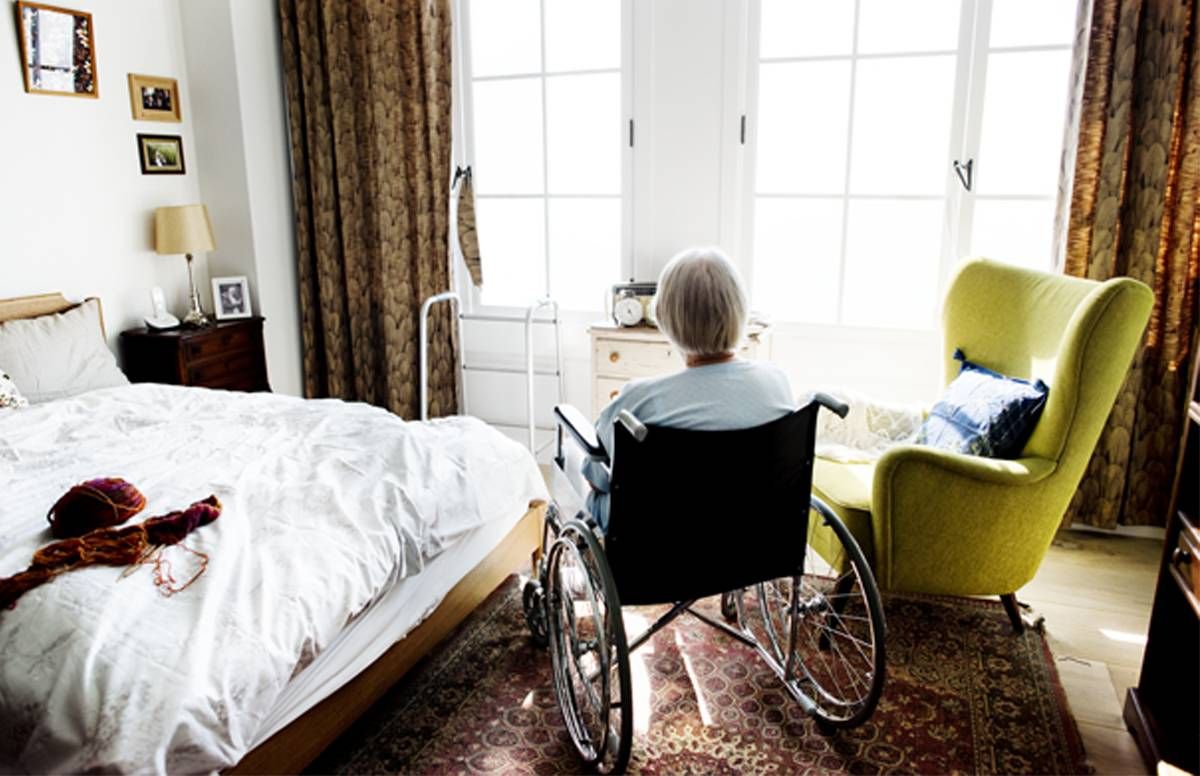Should You Consider Taking a Loved One Out of a Long-Term-Care Facility Now?
Guidance on making the decision due to the coronavirus pandemic
As modern living as we know it is drastically changing during this pandemic, so is assisted living. Already, many of us are facing difficult decisions about whether someone we know should stay in an assisted living facility or be taken out due to the coronavirus crisis. (In Worcester, Mass., the Beaumont Rehabiliation and Skilled Nursing Center nursing home is moving residents to other nursing facilities to make room for recovering COVID-19 patients.) If you’re in the position of bringing someone to hunker down with you, is it even a good idea?

Here is our guidance as long-term care and medical experts, speaking partly based on our own experiences:
Recently, Lori Frank’s husband asked his 89-year-old mother if she had thought about leaving her assisted living facility and moving in with them. She needs help to get dressed and to walk. The couple has a guest room, but it’s at the top of the stairs — a hazard if the mother left her room at night. How big is the risk to her health if she stays where she is? Is it bigger or smaller than if she moves?
For some nursing home residents, the trauma of relocation can have negative effects all their own.
Dr. Sharon Inouye’s mother is a fiercely independent, highly social, 91-year-old woman with high blood pressure, diabetes and poor balance who uses a walker. At the assisted living facility where she lives, Inouye’s mother participates each day in an exercise group, a bridge club, Bingo, arts and crafts and movie night. For now, she wants to stay where she is because she has friends, things to do and caring staff to help her when she needs it. But what if the activities get cancelled and socializing is prohibited due to COVID-19?
The Reasons for Living in a Long-Term-Care Facility
More than 1.7 million people live in long-term care in the U.S., including in nursing homes and assisted living facilities where older adults get the benefits of group living, like social interaction, and health care services.These were the reasons many of our parents and family members have moved to these facilities. But what about now?
There are no easy answers that apply to all situations, and for most people in these facilities, the answer is to stay put. But there are some who may benefit from temporarily moving out and into their family’s home or another non-institutional setting.
The answer depends on individual goals and preferences.
Our Commitment to Covering the Coronavirus
We are committed to reliable reporting on the risks of the coronavirus and steps you can take to benefit you, your loved ones and others in your community. Read Next Avenue's Coronavirus Coverage.
In the case of an imminent hurricane or fires, residents in long-term-care depend on staff for information and protection: Is the hurricane tracking near us? Is the generator in working order? But COVID-19 isn’t like any other natural disaster.
The pandemic is too new and we’re all learning new things about it every day.
Questions You Need to Ask Yourself
Here are the questions to ask if a loved one is in long-term-care to help think through the benefits and risks of staying or leaving temporarily:
Can the person get appropriate care outside of the facility? Some people in long-term-care facilities need help with eating, dressing, toileting, medication management and other activities. Others need more help than that. The pandemic does not change those considerations.
Nursing homes provide specialized care, and people who live there have health challenges, such as dementia or Alzheimer’s disease, beyond what most family members can manage at home.
For some of those residents, the trauma of relocation can have negative effects all their own. Furthermore, the risk of COVID-19 virus exposure won’t disappear outside of the nursing home. Should anyone in the household get sick after taking in the loved one, will care for the older adult suffer?
Regarding social isolation and the future for your loved one: Will you be allowed to visit him or her in the facility? And if your loved one moves into your home, will return to the facility be restricted later? Socialization is important. It’s possible that your family member will have less isolation by moving in with you. But if the assisted living facility closes to visitors, a resident who leaves temporarily may then be considered a “visitor” and be barred from re-entry for the foreseeable future.
The situation is dynamic, however, and many long-term-care providers are creating alternative virtual communication methods that allow families significant ongoing communication with their loved ones.
What will the impact of a move be on your family? It’s important to consider the impact of a move on other family members who, even if they’re not involved in the direct care, will take on new responsibilities. Changing roles can be a stressor. If you’ll be making the decision to bring your loved one into your home, everyone in your family should feel they were informed in advance, which can reduce stress.
How well can your household control infection risk? Are people in your home going to places where they may be at risk of infection? Are they able to maintain the recommended hygiene practices of frequent handwashing and cleaning of household surfaces to reduce infection risk?
How accessible is your home? Do you have ramps if your loved one will need them? Are there too many stairs? Are the bathrooms adapted with grab bars? Few homes are designed to minimize tripping and falls, which puts your loved one at higher risk for injury (and you don’t want to make a trip to the hospital more likely right now).
What will happen to older adults who get the infection after moving out and then need medical care?
For fall prevention resources, read Preventing Falls: A Guide to Implementing Effective Community-Based Fall Prevention Programs, from the Centers for Disease Control and Prevention and the AARP guide, Preventing Falls.
Questions to Ask the Long-Term Care Facility
Then, there are these questions to ask the long-term-care facility:
- What is your quarantine policy? You'll want to know the rules as they currently stand, realizing they may change.
- How well are you reducing infection risk? Does the staff have access to adequate personal protective equipment to protect them from infection, and do they have enough of these supplies to “decontaminate” as needed? Is the staff trained on appropriate use of personal protective equipment?
- Are you screening staff members for signs of illness, and providing them with education to reduce their exposure to COVID-19 from other health care facilities and the community?
- What will happen to older adults who get the infection after moving out and then need medical care? Is the transfer to a hospital or ICU easier or harder from outside of an assisted living facility?
- What will the happen to ones who get the infection after moving out but then recover? Will the facility let them re-enter?
- What are my loved one’s care needs? Reading a summary of them can help you determine whether you and your household can truly meet those needs at home.
The coming weeks and months will present us all with many challenging decisions. Clarifying our individual goals and preferences now can be the starting point for making decisions that are best for loved ones, for long-term- care facilities and for our society.


